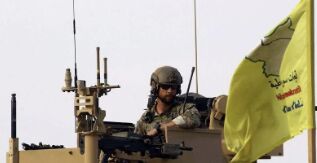Trump and Biden Shake Up Campaign Strategies, Defying Convention as Primaries Heat Up, While Uprising Threatens Stability in Syria
Trump and Biden's non-traditional campaign strategies showcase their dominant front-runner status, while U.S. officials address an uprising in Syria's Deir al Zor province against Kurdish rule.
In a surprising turn of events, both former President Donald Trump and President Joe Biden are opting for unconventional campaign strategies as the primary season enters its fall rush. While their rivals are hitting the campaign trail in early-voting states, Trump and Biden have taken a different approach. Biden, despite his underwater approval ratings, is maintaining a low-key campaign with just one rally since launching his 2024 reelection bid. His only scheduled appearance is at a union parade in Philadelphia. Similarly, Trump, who criticized Biden's "basement strategy" in 2020, has not campaigned for the past three weeks, with his last appearance at the Iowa State Fair in August. This non-traditional campaigning strategy highlights the dominant front-runner status of both candidates.
Recent polls show Biden leading his primary opponents by significant margins, while Trump remains ahead of his closest rival. With such massive leads, campaigning in early-voting states seems unnecessary. In a separate development, senior U.S. officials visited Syria's Deir al Zor province to address an uprising by Arab tribes against Kurdish rule. The unrest, which has led to clashes resulting in casualties, poses a significant threat to the Kurdish YPG militia and the U.S.-backed Syrian Democratic Forces (SDF).
The Kurdish-led forces, who played a crucial role in driving out ISIS from northern and eastern Syria in 2019, are facing backlash from the Arab tribal population. The arrest of a renegade Arab commander by the SDF triggered the unrest, with Arab tribal fighters initially pushing out the Kurdish-led forces from several towns in the strategic oil belt of Deir al Zor. To mitigate the situation, U.S. Deputy Assistant Secretary of State for Syria Ethan Goldrich and Major General Joel B Vowell, who heads the coalition against ISIS, held meetings with Arab tribal leaders and SDF commanders. The discussions aimed to address local grievances, de-escalate violence, and prevent casualties.
The U.S. military presence in SDF-run areas has been instrumental in checking the influence of militias backed by Russia and Iran, who have a foothold in the western parts of Syria. SDF officials have accused Iran and the Damascus government of fueling the unrest by deploying tribal militias to the northeast of Syria. Arab tribal leaders assert that they have been deprived of their oil wealth since the Kurdish-led forces gained control of Syria's largest oil wells. They also claim that their regions have been neglected in favor of Kurdish-majority areas.
As a result, they demand the complete removal of Kurdish rule from Deir al Zor and the restoration of local Arab governance. The SDF, however, denies allegations of discrimination against the Arab population and attributes the unrest to remnants of ISIS. Western diplomats reveal that the United States has been pushing for greater representation and decision-making power for Arab inhabitants in SDF-controlled areas. Overall, these developments in the U.S. primary campaign and the Syrian uprising highlight the unique challenges faced by both Trump and Biden, as well as the complex dynamics in the Middle East. As the primary season continues and the situation in Syria unfolds, the strategies and actions of these leaders will undoubtedly shape the future of their respective campaigns and the regions they govern.




